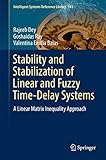Stability and Stabilization of Linear and Fuzzy Time-Delay Systems [electronic resource] : A Linear Matrix Inequality Approach / by Rajeeb Dey, Goshaidas Ray, Valentina Emilia Balas.
By: Dey, Rajeeb [author.] .
.
Contributor(s): Ray, Goshaidas [author.] | Emilia Balas, Valentina [author.]
| Emilia Balas, Valentina [author.] | SpringerLink (Online service)
| SpringerLink (Online service) .
.
Material type:  BookSeries: Intelligent Systems Reference Library: 141Publisher: Cham : Springer International Publishing : Imprint: Springer, 2018Edition: 1st ed. 2018.Description: XX, 267 p. 43 illus. online resource.Content type: text Media type: computer Carrier type: online resourceISBN: 9783319701493.Subject(s): Computational intelligence
BookSeries: Intelligent Systems Reference Library: 141Publisher: Cham : Springer International Publishing : Imprint: Springer, 2018Edition: 1st ed. 2018.Description: XX, 267 p. 43 illus. online resource.Content type: text Media type: computer Carrier type: online resourceISBN: 9783319701493.Subject(s): Computational intelligenceThis book provides a clear understanding in formulating stability analysis and state feedback control of retarded time delay systems using Lyapunov’s second method in an LMI framework. The chapters offer a clear overview of the evolution of stability analysis in terms of the construction of a Lyapunov functional and use of the integral inequalities in order to reduce the gap of delay upper bound estimate compared to frequency domain method through existing and proposed stability theorems. Power system engineering problem has been presented here to give readers fair idea on applicability of the model and method for solving engineering problems. Without deviating from the framework of analysis more complex dynamics of the system have been dealt with here that includes actuator saturation and thereby ascertaining local stability for an estimated time-delay and domain of attraction. Nonlinearity in a time-delay system has been dealt with in the T-S fuzzy modeling approach. This book is useful as a textbook for Master’s students and advanced researcher working in the field of control system engineering, and for practicing engineers dealing with such complex dynamical systems. The strengths of the book are lucidity of presentation, lucidity of solution method, MATLAB programs given in the appendix that help the novice researcher to carry out research in this area independently, clear idea about the formulation of desired stability and control problem in a LMI framework, application problem provided can motivate students and researcher to recast their problems in the similar framework easily, helpful for readers to use the stability (stabilization) conditions or formulate their own stability conditions easily for a complicated linear or nonlinear dynamical system.


There are no comments for this item.